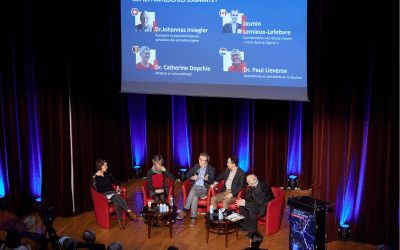On March 28th, as part of the French National Consultations on Bioethics, a meeting was held at Saint-Louis Hospital by the Île-de-France “Ethical Forum” for counter-expertise assessments. Nine proposals were chosen, including that of Blanche Streb, Alliance Vita’s Director of Training and Research, who spoke on issues related to artificial reproduction.
Full transcript of Blanche Streb’s speech:
“Thank you Mr. Emmanuel Hirsch and your staff for organizing this discussion.
I would like to discuss some thoughts on artificial reproduction with you, and how far it should go. The ethical issues are much more considerable than the injustice, which is indeed a very serious issue, of legalizing the making of babies who would be deliberately deprived of a father.
This evening I suggest we take “one step ahead”.
Indeed, this goes much further, leading to a radical change. Where are we headed if reproduction is no longer restricted to male-female couples, infertile or sterile, and of childbearing age? Isn’t it a paradigm shift, a profound change for humanity regarding the way children are manufactured?
Shouldn’t we agree on limits to be defined?
To clarify, I would like to briefly mention some topics mentioned by the National Consultative Ethics Committee (hereafter referred to as: “CCNE”), on the French Consultations for Bioethics website. The Parliamentary Office for the Evaluation of Scientific and Technological Choices (hereafter referred to as “OPECST”) also made recommendations on these topics.
Therefore, it is possible to include them in the upcoming legislation, since researches are currently underway, including here in France.
- 3-Parent IVF (cited by “CCNE and “OPECST”): This technique has been authorized in England. And babies have already been born in Mexico and Ukraine. Using gametes from 3 people: one man and two women, it results in a genetically modified embryo. The aim was to avoid transmission of a hereditary mitochondrial disease by the mother.
This technique seems to target the reproductive market, particularly for “rejuvenated” oocytes. Babies have already been born using this technique, in Ukraine for instance, where mitochondrial pathology was not a problem.
- Human embryos used as laboratory material and their DNA modified
This topic was selected by the CCNE to be discussed: “Should we authorize scientific research leading to transgenic or chimerical embryos? What about the use of molecular scissors (CRISPR/Cas9) in embryo research? “
“OPECST” has made recommendations in favor of this research and suggests modifying the regulations (in particular the Oviedo Convention) to end the prohibition for creating genetically modified embryos, and then examine the possibility of making babies using these methods.
Applying this technique to human embryos would be the fastest and most direct way to manufacturing customized babies.
- Artificial gametes
Artificial gametes can be obtained in different ways: by “breaking through the time wall” of an embryonic cell that is programmed to become a gamete, or by “going back in time” with an adult cell (such as a skin cell).
- Continually trying to produce a “perfect baby”?
By increasing genetic screening prior to conception or expanding the recourse to screening embryos (doing more pre-implantation genetic diagnosis (PIGD) testing / continually adding sorting criteria: pathologies, predisposition, and esthetics).
What are the scientific, ethical and security issues?
This brings up questions. Biotechnological changes are leading us towards 2 contradictory and perilous directions: that of sorting embryos for the perfect baby, and that of manufacturing a baby at all costs, even to the point of putting his health at risk.
The discussion points that I have just mentioned bring up a new concept of human reproduction: customized and by special order.
These techniques don’t even cure anyone most of the time; but they do create someone. They use ART to conceive potentially non-viable or sick embryos and then need the technique to “fix” them. There is absolutely no guarantee of efficiency; and still less of safety. Nonetheless, some researchers are conducting or already planning human clinical trials, or rather, clinical experiments using humans. It is especially worrisome to imagine children being manufactured under these circumstances: ignoring the precautionary principle, these techniques are using babies as guinea pigs. These modifications can be congenitally transferred thus having a hereditary impact on future generations.
What would this radical change implicate?
- Endorsing the right to have a child
- Subjugating medicine to serve individual aspirations
- France would gradually shift to reproductive business
- One step further towards classifying and sorting out human beings and manufacturing customized babies. Taking one step further towards eugenics which is insidiously and increasingly creeping into our society. Because we are asking technology to judge which lives are worth living or no worth living.
Basically, isn’t this radical change a way of subjecting life to a biotechnological domination? Is this what we want for our country and our future generations?
What do I recommend ?
- That France should resist to the globalized reproductive market, to more sorting of embryos, to more eugenics.
- That France should continue to be a model of resistance, thanks to its bioethical laws, its vision of humanity, its tradition of human rights, its laws safeguarding the principles of inviolability, inalienability and non-ownership of the human body. Inviolability of the human body to protect against the others, inalienability to protect against oneself; and non-ownership, to protect against the power and pressure of money to allow free gifts. This last principle claims that the body, its organs, or its products cannot be sold, in order to protect individuals against themselves from agreeing under the pressure of money or desperate need of it.
- France should recall that laws are not made for science, but for protecting individuals, and that bioethics should not be ruled by technological advances.
Conclusion:
During these National Consultations on Bioethics we are asked: “What kind of world do we want for the future? In response, two other questions can help clarify the debates.
- does technological progress always go with a progress for humanity?
- on what grounds can a desire become a right?
Indeed, what kind of society are we developing if we no longer protect the weakest, the most vulnerable?
Don’t people on earth deserve better than knowing that their right to existence is based on corresponding to certain criteria? ”



